How Gamers Actually Sleep
- Adults who played video games at least once a week as teens or preteens sleep 47 minutes more each night than they did as adolescents, according to a survey.
- 61.3% of adults spend less time playing video games than when they were adolescents.
- Adult respondents play video games for 3 hours, 50 minutes daily.
- As adolescents, respondents played video games 5 hours, 49 minutes daily, at their gaming peak.
- 77.9% of adults say getting enough sleep is more important than success in a game.
Tim Lakdawala started gaming at age 3. By high school, video games took up a few hours of his night, every night.
“I was a teenager with superpowers,” says Lakdawala, 31, of San Diego. “I could get four hours of sleep, wake up, go to school, and it was fine.”
Lakdawala turned his gaming passion into a career as a game-build engineer for Sony Interactive Entertainment. Adulthood hit reset on his 2 a.m. bedtime, however.
It’s likely for the best: Researchers at Flinders University in Adelaide, Australia, recently found that adolescents push bedtime back by 16 minutes for every 30 minutes they spend playing video games. Despite a slide in video-game sales in 2022, gaming is still a $50+ billion industry each year. With sales of everything from Xbox and Sony PlayStation systems to Call of Duty: Modern Warfare II expected to increase from Black Friday through the holidays, those marathon gaming sessions might only be increasing for adolescents ages 10 to 19.
But what about adults, especially for the multiple generations who have grown up playing video games? Do we, like Lakdawala, return to optimal sleep quality ? Or do our bodies adjust to extended Fortnite exposure?
Got a hot tip? Pitch us your story idea, share your expertise with SleepFoundation.org, or let us know about your sleep experiences right here.
SleepFoundation.org asked 1,250 U.S. adults ages 21 to 64 who had played video games at least once a week as adolescents how their habits changed. Among respondents, 61.3% agree that they spend less time gaming now than as adolescents (though 10.2% strongly disagree). Their sleep also increased, from 6 hours, 2 minutes during their adolescent gaming peak to 6 hours, 49 minutes now, right around the recommended seven hours . That’s a gain of 47 minutes through adulthood.
While 60.1% say gaming success was more important than getting enough sleep as an adolescent, 77.9% say sleep is more important now.
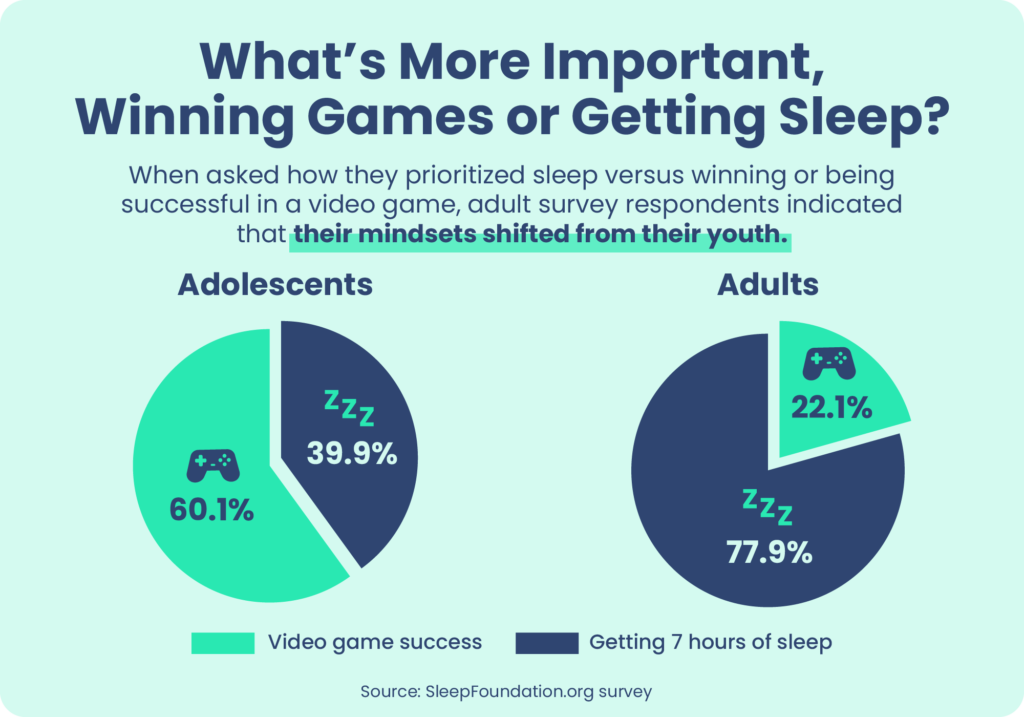
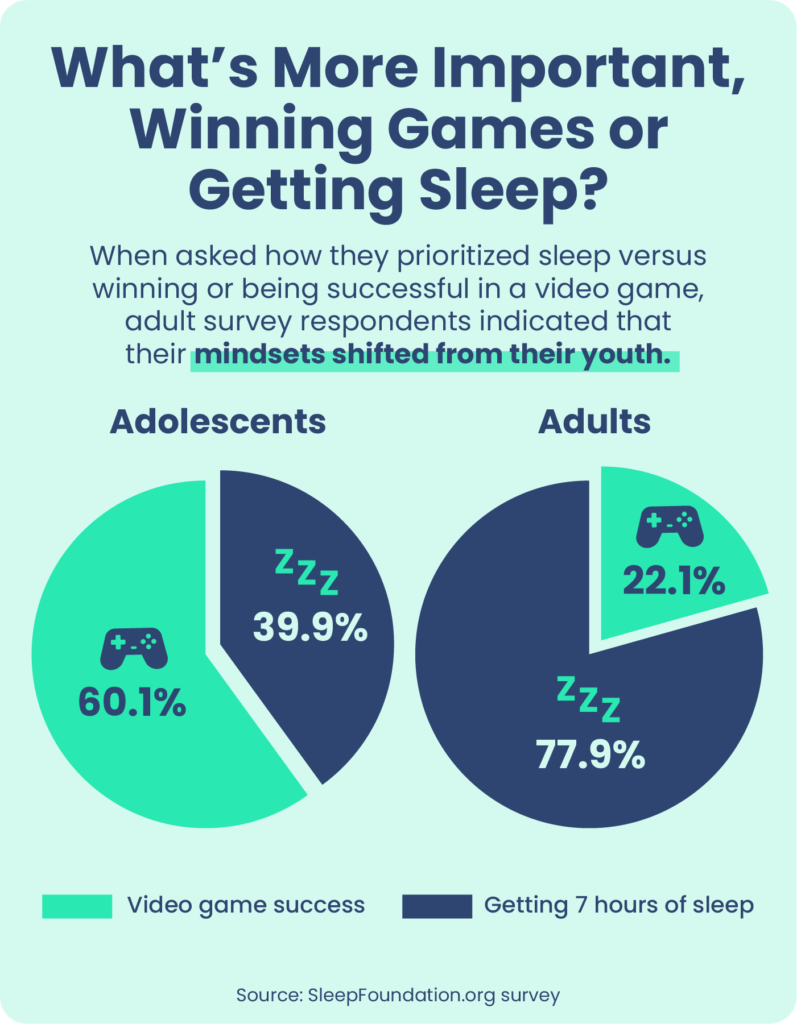
Here’s a deeper look into how and why our gaming habits evolve, especially when it comes to our sleep.
Are Late-Night Video Games Really So Bad?
When they played games the most as adolescents, survey respondents averaged 5 hours, 49 minutes of gaming per day — nearly as much time as the six hours they spent sleeping. Overall, 90.6% of respondents say they played video games at least twice a week as teens, with nearly half (48%) playing daily.
That gaming time bled into other time. Roughly one-third of respondents, or 33.4%, say they regularly skipped school or work in favor of a game. Often, that came after a late night of gaming, as 74% of survey respondents agreed they would also regularly stay up late to game as a teen; 53.8% still do.
Lakdawala says he’d often sleep in until as late as noon after a night of gaming when he was younger.
“I’d catch up on the weekends,” he says.
So how bad is that, really?
“Adolescents are predisposed to be night owls,” says Wendy M. Troxel, Ph.D., a sleep researcher and senior behavioral scientist at RAND Corp. and a SleepFoundation.org medical advisory board member. “Soon after puberty, they experience a delay in their circadian rhythms, which makes them naturally prefer staying up later and getting up later. Their minds are alert at night, and gaming is what they do to relax.”
On the flip side, adolescence is a critical period of development, especially for sleep. Experts recommend that teens sleep eight to 10 hours each night.
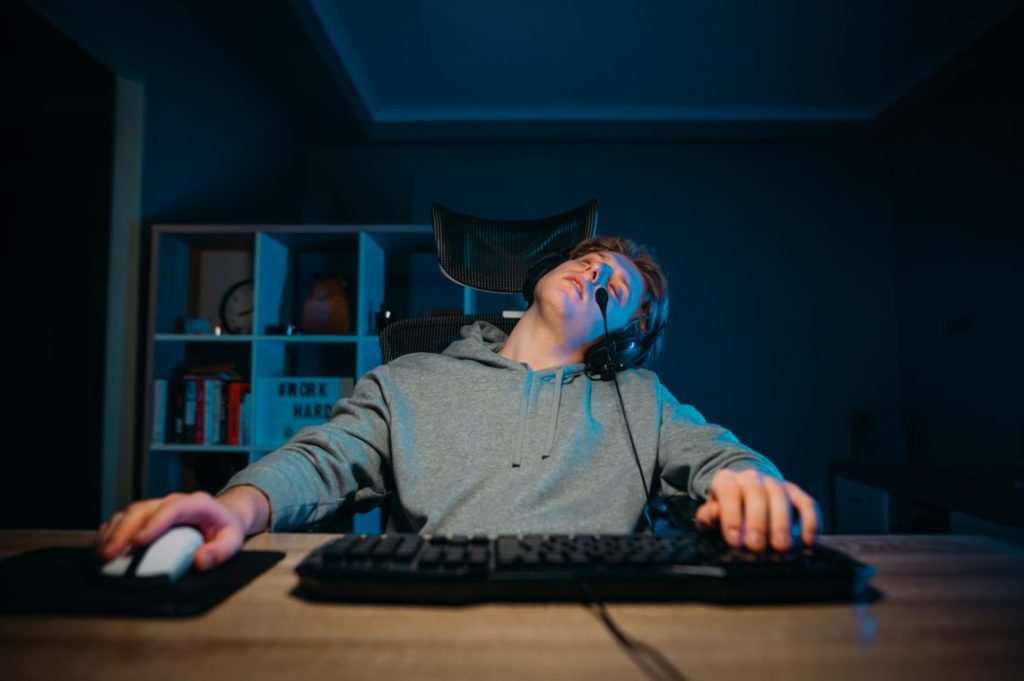
“When sleep goes wrong in the teenage years, it’s incredible how that can send them down a different trajectory into adulthood,” says Michael Gradisar, Ph.D., one of the authors of the Australian study and head of sleep science at Sleep Cycle, which is not affiliated with the study.
Gaming and watching YouTube videos are the activities least conducive to getting at least seven hours of sleep, according to the study Gradisar co-authored. YouTube pushed lights-out by 11 minutes per half-hour watched, and laptops pushed them back 9 minutes.
Gradisar says video games and video in general pull users into a flow state, making it difficult to turn off a device at what might otherwise be a natural stopping point, such as a lull in gameplay.
While 68.2% of survey respondents say they’d play a new game as soon and as much as possible as an adolescent, that dropped to 57.3% for adults.
It can change, though: 47.9% of respondents to the SleepFoundation.org survey say they often slept less than five hours a night to accommodate gaming. But as adults, that dropped to 37.8%. And 52.1% of respondents agreed with the statement that, as adolescents, they were told they played video games too often; 38.9% still get that feedback.
“Not all gaming is bad for sleep and mental health,” says Troxel, who points to a recent meta-analysis that disproved long-held beliefs about gaming as a reason for aggression in children and another that showed video games increase children’s cognitive performance . “But there are reasons to be wary.”
Do We Level up on Sleep Over Time?
So where does the game end and good sleep begin?
For adults, the lure of sleep may be stronger than the lure of a new game. Average gaming time for adults was nearly two hours less than as adolescents — at 3 hours, 50 minutes versus 5 hours, 49 minutes — per the survey. While 68.2% of survey respondents say they’d play a new game as soon and as much as possible as an adolescent, that dropped to 57.3% for adults.
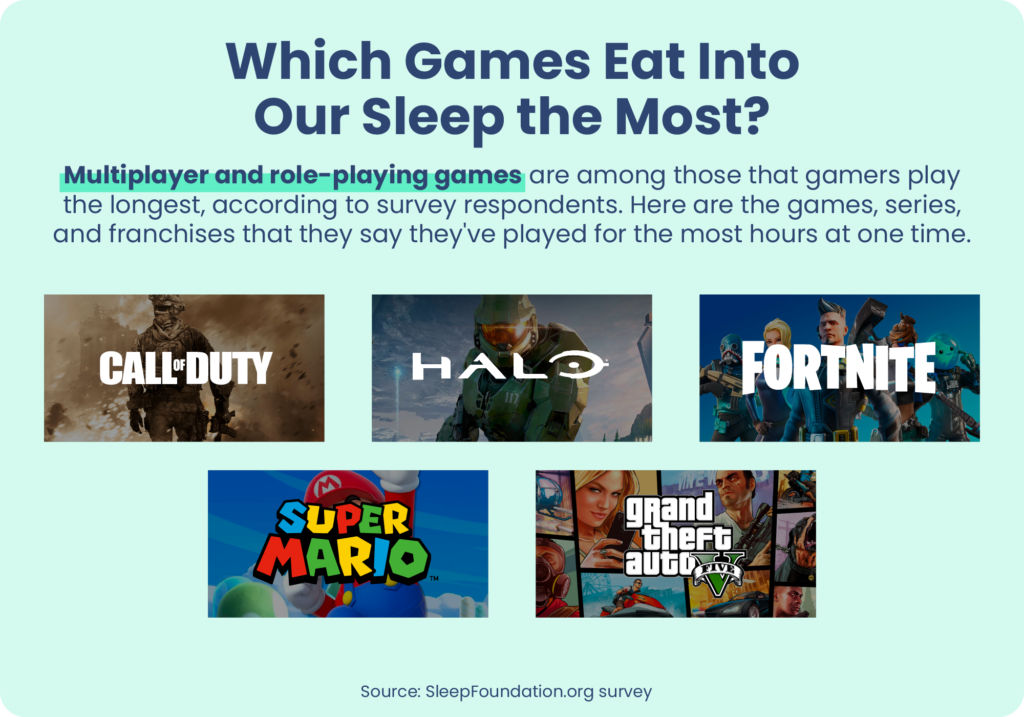
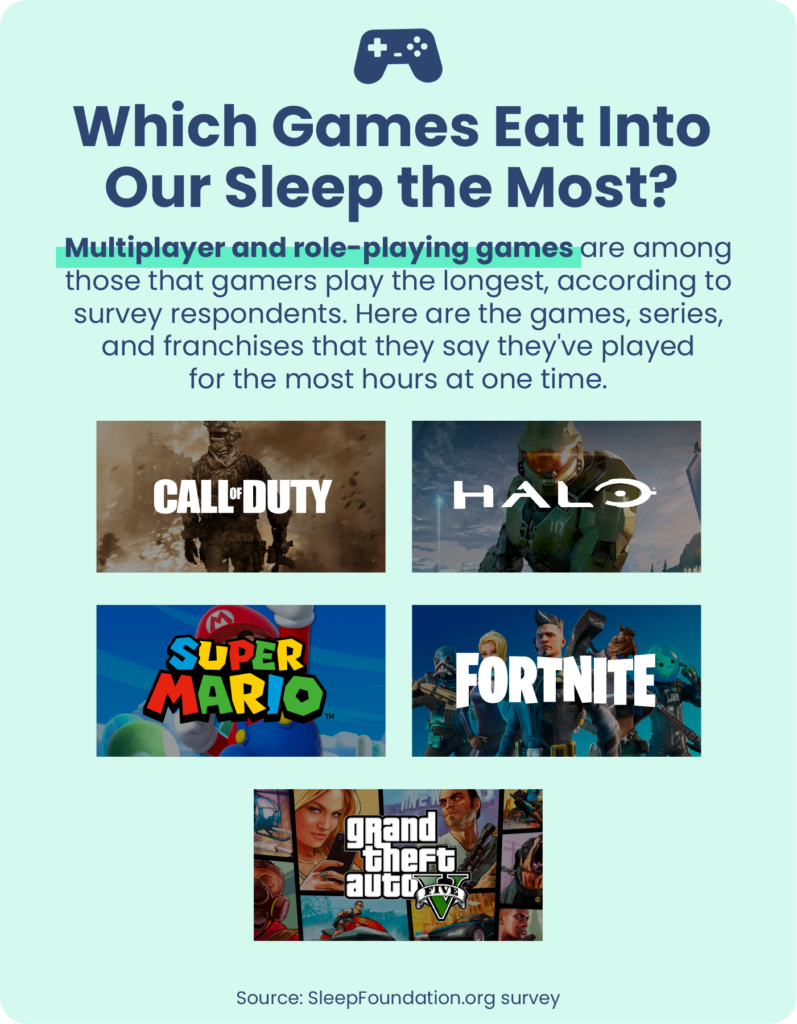
For Lakdawala, it was learning what works for him and training himself to find a balance.
Because he has attention-deficit/hyperactivity disorder (ADHD), Lakdawala says he needs structure to keep him on task. That means keeping an eye on the time and listening to his body to know when his ideal quit time is. Lakdawala says he plays only two to four hours on weeknights and aims to wind down by 10 p.m.
“If I go past that, I won’t be able to fall asleep until 2 or 3 a.m., or I’m restless the rest of the night,” he says.
That recognition is important, says Dr. Michael J. Breus, Ph.D., a clinical psychologist and founder of SleepDoctor.com. (Sleep Doctor is the parent company of SleepFoundation.org).
“People lose track of time when they game,” Dr. Breus says. “If you’re having a bad game or doing really well, you keep [playing]. That’s not what you need to be doing within 90 minutes before bed.”

Dr. Breus suggests gamers use a physical timer and stop playing 90 minutes before bed. If the timer is too easy to ignore, try placing it on the opposite side of the room or connect it to your gaming console, he advises.
“Run an experiment,” he says. “Get good sleep and then see if your work or performance gets better. People have to find their sweet spot. Are you falling asleep within 20 minutes? If you’re not, try pushing your gaming back a little bit more and see what happens.
“It’s very individual, and it’s very differentiated. Sleep is not an on/off switch.”
Methodology
The survey commissioned by SleepFoundation.org was conducted on the online survey platform Pollfish on Oct. 13 to 14, 2022. Results are from 1,250 survey participants who had played video games as an adolescent (ages 10 to 19), were between the ages of 21 and 64, and lived in the United States at the time of the survey; adults in Idaho, Kansas, Nebraska, North Carolina, South Carolina, and Wyoming were excluded because of related regulations in those states regarding cannabis-related questions in the survey. All respondents attested to answering the survey questions truthfully and accurately. For more information, email press@sleepfoundation.org.
References
7 Sources
-
Pillion, M., Gradisar, M., Bartel, K., Whittall, H., & Kahn, M. (2022). What’s “app”-ning to adolescent sleep? Links between device, app use, and sleep outcomes. Sleep medicine, 100, 174–182.
https://pubmed.ncbi.nlm.nih.gov/36084495/ -
Aycock, J. (2022, November 15). Videogame sales flatten out as “Modern Warfare II” leads game content rebound. SeekingAlpha.
https://seekingalpha.com/news/3907601-videogame-sales-flatten-out-as-modern-warfare-ii-leads-games-rebound -
Watson, N. F., Badr, M. S., Belenky, G., Bliwise, D. L., Buxton, O. M., Buysse, D., Dinges, D. F., Gangwisch, J., Grandner, M. A., Kushida, C., Malhotra, R. K., Martin, J. L., Patel, S. R., Quan, S. F., & Tasali, E. (2015). Recommended Amount of Sleep for a Healthy Adult: A Joint Consensus Statement of the American Academy of Sleep Medicine and Sleep Research Society. Sleep, 38(6), 843–844.
https://pubmed.ncbi.nlm.nih.gov/26039963/ -
Randler, C., Faßl, C., & Kalb, N. (2017). From Lark to Owl: developmental changes in morningness-eveningness from new-borns to early adulthood. Scientific reports, 7(1), 1-8.
https://www.nature.com/articles/srep45874 -
Paruthi, S., Brooks, L. J., D’Ambrosio, C., Hall, W. A., Kotagal, S., Lloyd, R. M., Malow, B. A., Maski, K., Nichols, C., Quan, S. F., Rosen, C. L., Troester, M. M., & Wise, M. S. (2016). Recommended Amount of Sleep for Pediatric Populations: A Consensus Statement of the American Academy of Sleep Medicine. Journal of clinical sleep medicine : JCSM : official publication of the American Academy of Sleep Medicine, 12(6), 785–786.
https://pubmed.ncbi.nlm.nih.gov/27250809/ -
Drummond, A., Sauer, J.D, and Ferguson, C.J. (2020) Do longitudinal studies support long-term relationships between aggressive game play and youth aggressive behavior? A meta-analytic examination.R. Soc.Open Sci.7: 200373.
https://royalsocietypublishing.org/doi/10.1098/rsos.200373 -
Chaarani B, Ortigara J, Yuan D, Loso H, Potter A, Garavan HP. Association of Video Gaming With Cognitive Performance Among Children. JAMA Network Open. 2022;5(10):e2235721.
https://jamanetwork.com/journals/jamanetworkopen/fullarticle/2797596












































































